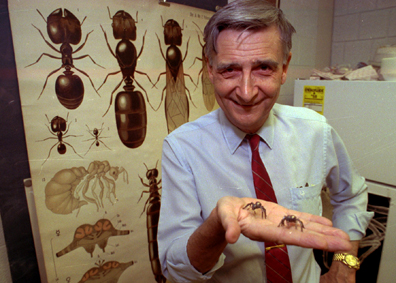Even Math Dummies Can Do Science
By Peter LloydWhen a great scientist—make that one of today’s greatest scientists—publically declares that a successful scientist need not possess math proficiency, it just might be time for creative people with weak math skills to take another look at pursuing science as a career.
 Some of our most successful scientists are “mathematically no more than semiliterate,” according to E. O. Wilson, the father of sociobiology and the world’s leading authority on ants, writing in the Wall Street Journal.
Some of our most successful scientists are “mathematically no more than semiliterate,” according to E. O. Wilson, the father of sociobiology and the world’s leading authority on ants, writing in the Wall Street Journal.Since measurement is absolutely essential for doing science, and measurement always involves numbers and math, how could this be? The answer, says Wilson, lies in collaboration between creative scientists with new ideas and support from collaborators who can do the math.
Ideas in science emerge most readily when some part of the world is studied for its own sake… If that step proves too technically difficult for the person who made the discovery, a mathematician or statistician can be added as a collaborator.Ideas rule, the devil follows with details. Let’s look at the record. Two of recent history’s greatest scientists, Charles Darwin and Albert Einstein, could not be called math geniuses. Darwin used little to no math in his world-shaking work and Einstein, although his work might even be considered pure math, got to his greatest insights by way of thought experiments.
An Erdös 1 mathematician admitted to me, “I can’t do arithmetic,” even though he publishes scholarly papers on topics including lattices, arithmetic mean ideals, trace extensions, and infinite dimensional Schur-Horn theorem and majorization theory.
Wilson even confesses in Great Scientist ≠ Good at Math that he was “never more than a C student” in math. And in response to his personal experience, he offers two principles of encouragement to math-challenged scientists.
Wilson’s Principle No. 1: It is far easier for scientists to acquire needed collaboration from mathematicians and statisticians than it is for mathematicians and statisticians to find scientists able to make use of their equations.
Wilson’s Principle No. 2: For every scientist, there exists a discipline for which his or her level of mathematical competence is enough to achieve excellence.
See also:
- Great Scientist ≠ Good at Math by E. O. Wilson
- Why Good Scientists Don’t Have to Be Great at Math by Beryl Lieff Benderly
Peter Lloyd is co-creator with Stephen Grossman of Animal Crackers, the breakthrough problem-solving tool designed to crack your toughest problems.
Right Brain Workouts Explained
